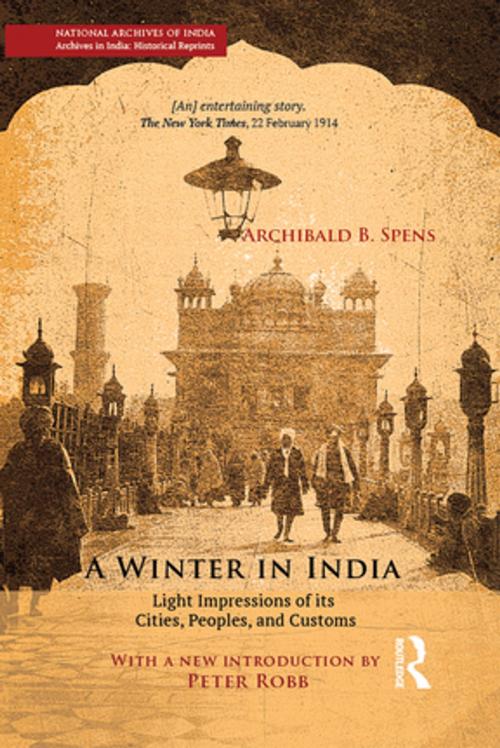A Winter in India
Light Impressions of its Cities, Peoples and Customs
Nonfiction, History, Asian, India, Art & Architecture, Architecture, Fiction & Literature, Anthologies| Author: | Archibald B. Spens | ISBN: | 9781317562542 |
| Publisher: | Taylor and Francis | Publication: | June 12, 2015 |
| Imprint: | Routledge India | Language: | English |
| Author: | Archibald B. Spens |
| ISBN: | 9781317562542 |
| Publisher: | Taylor and Francis |
| Publication: | June 12, 2015 |
| Imprint: | Routledge India |
| Language: | English |
A charming travelogue set in the British Raj, A Winter in India presents a fascinating journey across people, customs, languages, cities, monuments, and landscapes. Spens’ thrilling and amusing anecdotes and multifarious experiences — of the rugged Khyber Pass and its tribes, the military history and the Mutiny of 1857 at Kanpur and Lucknow, religion and rituals at Banaras, the grandeur of the "pink" city Jaipur, the seedy opium dens by night and the "Towers of Silence" by day in Mumbai, to a "remembrance of things past" in Agra and Delhi — map the changing contours of British Raj in India. It also depicts the British engagement with India, and offers insights into its emergence as a modern nation.
The new Introduction by Peter Robb locates Spens’ complex and wide-ranging explorations of the "Orient" in a historical context. It discusses the ambivalent outlook of the British towards the "East" at the turn of the century, illustrating Spens’ mix of prejudice and admiration that also typified British attitudes to India, and helps explain the character and influence of imperial rule.
This book will deeply interest readers of modern Indian history, travel literature, South Asian studies, cultural anthropology, ethnography, as well as the general reader.
A charming travelogue set in the British Raj, A Winter in India presents a fascinating journey across people, customs, languages, cities, monuments, and landscapes. Spens’ thrilling and amusing anecdotes and multifarious experiences — of the rugged Khyber Pass and its tribes, the military history and the Mutiny of 1857 at Kanpur and Lucknow, religion and rituals at Banaras, the grandeur of the "pink" city Jaipur, the seedy opium dens by night and the "Towers of Silence" by day in Mumbai, to a "remembrance of things past" in Agra and Delhi — map the changing contours of British Raj in India. It also depicts the British engagement with India, and offers insights into its emergence as a modern nation.
The new Introduction by Peter Robb locates Spens’ complex and wide-ranging explorations of the "Orient" in a historical context. It discusses the ambivalent outlook of the British towards the "East" at the turn of the century, illustrating Spens’ mix of prejudice and admiration that also typified British attitudes to India, and helps explain the character and influence of imperial rule.
This book will deeply interest readers of modern Indian history, travel literature, South Asian studies, cultural anthropology, ethnography, as well as the general reader.















